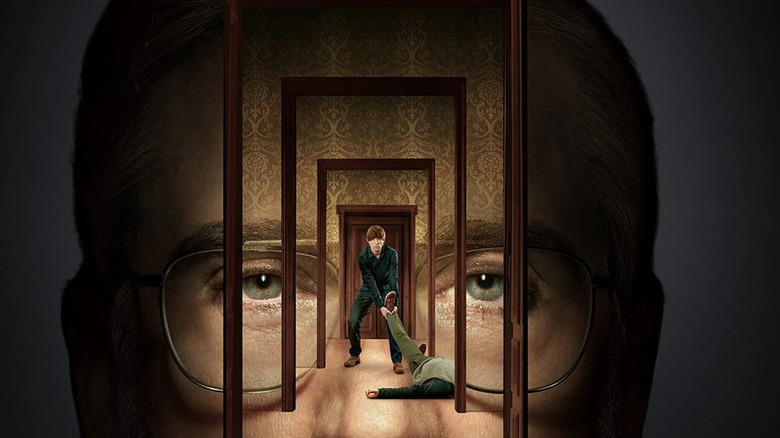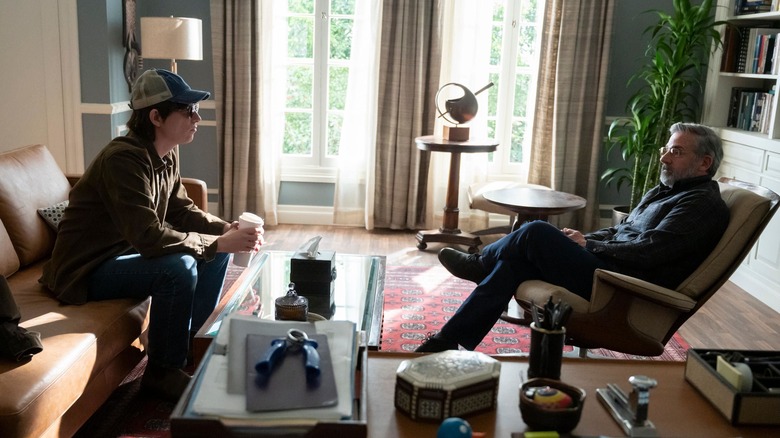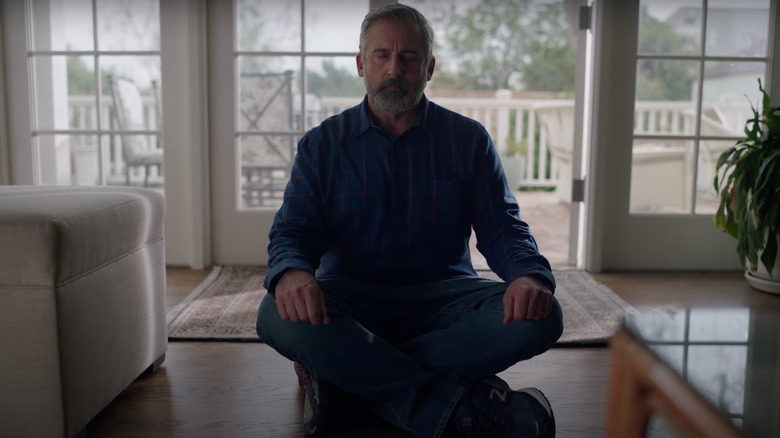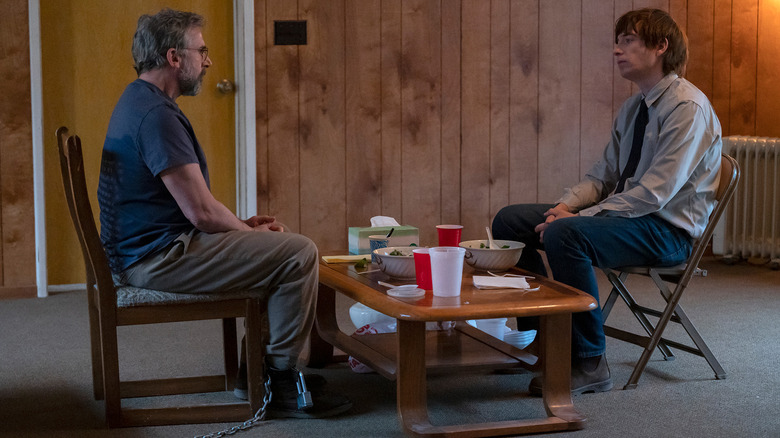The Patient Is A Good Miniseries That Would've Been A Great Movie
Spoilers for "The Patient" follow
On October 25, 2022, "The Patient" concluded its 10-episode run. The mini-series tells the story of Dr. Alan Strauss (Steve Carrel), a therapist held captive by one of his patients, Sam Fortner (Domhnall Gleeson). It turns out Sam didn't disclose a pretty big detail during their sessions — he's a serial killer. As my /Film colleagues have said, serial killer stories have been done to death. To stand apart, "The Patient" adds a new wrinkle: Sam wants to stop killing. He's abducted Strauss not to murder him, but to be his in-house therapist. Early on, Alan tells Sam that anyone who's willing to go to therapy can be helped. The story is designed to test his thesis.
Due to the confined setting, the series relies on flashbacks to flesh out Alan. We learn how his relationship with his son Ezra (Andrew Leeds) fell apart after Ezra converted to Orthodox Judaism. The gulf only widened when Beth (Laura Niemi), Alan's wife/Ezra's mother, passed away. Now, Alan left things cold with a son he may never see again.
"The Patient" is a story worth telling — but a mini-series was not the best format to tell it.
The good stuff
The greatest strength of "The Patient" is its lead performances. Since 2014's "Foxcatcher," Steve Carell has been trying to become a dramatic actor. He admitted in a 2018 Esquire profile that he only became a comic actor out of "necessity." His turn to drama has had mixed results, but his performance as Alan is a success. Carell's comic instincts involve a lot of screaming, so he goes subdued to disappear into the character. He has the "therapist voice" down: gentle, slow, and inquisitive.
Domnhall Gleeson, ironically, acts well as someone who doesn't know how to act human. His trademark red hair is dyed dark brown and left uncombed, further separating actor from character. He wears a permanent, piercing scowl and says so few words you're never quite sure when Sam is going to snap.
Given the confined setting, the supporting cast is pretty meager. The most recurring face is Sam's horrified but complicit mother Candace (Linda Edmond). She ultimately gets too little focus for my taste but Edmond's performance, when she gets the spotlight, is strong.
In Alan's corner is Charlie (David Alan Grier), his own (deceased) therapist. To cope with the stress, Alan begins having conversations with an imaginary Charlie in his mind palace. Charlie provides both counsel for Alan and comic relief for the audience.
The problem with "The Patient" isn't the content. It's the presentation of it.
The pacing disturbs the suspense
The demise of the mid-budget film has had disastrous consequences for the entertainment industry. Stories that would've once been made into such films are instead stretched thin into mini-series. In the era of streaming, that's the only way they can get made and find an audience.
Pacing problems afflict both prestige series like "Under The Banner of Heaven" and franchise entries like "Obi-Wan Kenobi." These series are bloated, with padded hour-long episodes and stories that run in circles. As we've written about before, these mini-series feel less like TV and more like chopped-up, 6-10 hour long movies. This makes for less rewarding viewing than truly episodic TV or a tightly-paced film.
What initially excited me about "The Patient" was that the episodes (almost) all run under 40 minutes. The shortest is the premiere, "Intake," at 21 minutes, and the longest is the finale, "The Cantor's Husband," at 46. "The Patient" choosing to trim all the fat and cut to the heart seemed like a wise approach. As weeks went by, I found this was creating a different problem. The short breadth of "The Patient" meant it lacked the suspense its premise required. You should be as on edge as Alan is, but the frequent breaks in the story mean that you simply aren't.
The series isn't even totally free of the slow pacing that plagues longer mini-series. Episode 4, "Company," focuses on Alan's attempts to stop Sam from killing his kidnapped victim Elias (Sam Rich). This carries over into episode 5, "Pastitsio," until Sam kills Elias at that episode's end. One episode's worth of material stretched into two.
The ending
Now comes the ending — Sam resists the urge to kill his abusive father and Alan says it's time for Sam to turn himself in so he can really get better. When Sam refuses, Alan holds a makeshift knife to Candace's throat and tries to force Sam to call 9/11. After a fake-out dream sequence of Alan reunited with his family, we cut to reality, where he's been strangled by Sam. Alan's killer is kind enough to at least anonymously pass along the doctor's last letter to his children.
This would be an effective sucker punch if we'd only invested 2 hours into these characters. After 5 (spread over 2 months) though, it instead comes off as a nihilistic middle finger that denies the audience catharsis. What was the point of watching Alan realize he'd mistreated Ezra if father and son never get a proper resolution?
As for Sam, he remembers Alan telling him it's only a matter of time before he kills again. So, he locks his own leg into the chain which kept Alan bound, handing the key to his mother. The intent is clear; Sam has forged his own chains, Jacob Marley style, and that he accepts them is a sign of growth. In practice, though, it's too slight a punishment to be karmic, especially since Candace, his enabler, is not fit to be his jailkeeper.
I'd be willing to bet "The Patient" plays stronger as a binge than a week-to-week watch. That just furthers my argument, however, that the series would be stronger as a single, tight package, not a series of chapters.
Where The Patient struggles, The Americans succeeded
The failure of "The Patient" to take advantage of the television medium is frustrating. Doubly so, because there's proof this creative team can do just that.
As we've covered before, "The Patient" co-creator Joe Weisberg's last series "The Americans," about two USSR sleeper agents living in 1980s' America as a married couple, excelled at mining prestige writing from a pulpy premise. "The Americans" masqueraded as a spy thriller, but it was foremost a family drama. The three directors of "The Patient" (Chris Long, Kevin Bray, and Gwyneth Horder-Payton) are all "Americans" alums as well. Long in particular directed the dazzling finale, "START."
Why does "The Americans" succeed where "The Patient" struggles? It had a sturdier foundation for a long-running story. There was always new missions that the Jennings would have to undertake for their KGB handlers. Even better, the domesticity was even more compelling than the espionage. You may have came to "The Americans" for the Fleetwood Mac-scored car chases, but you stayed to watch the ups and downs of the marriage between Elizabeth (Keri Russell) and Philip (Matthew Rhys), or their daughter Paige (Holly Taylor) realizing her parents aren't what they appear. Lastly, there was always the specter that the Jennings would be discovered by their neighbor/FBI agent Stan Beeman (Noah Emmerich).
"The Patient," on the other hand, had a premise with a shelf-life. While Alan's death wasn't a foregone conclusion, he couldn't stay in Sam's basement forever.
Not everything has to be dragged out as long as possible. Short stories can be the sweetest.




